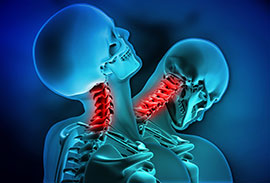Traumatic Brain Injury
 Not all head injuries lead to brain trauma, but those that do can lead to a lifetime of consequences. Mild traumatic brain injuries can cause memory loss, anxiety, depression, loss of sleep, changes in personality, and a variety of other problems. A moderate injury can profoundly alter your ability to work and live independently. Severe injuries can result in coma and even death. Medical treatment, rehabilitation, specialized equipment, and continued care may cost millions of dollars. At Huber Thomas Law, we stand up for your rights after a traumatic brain injury. We can help you get the compensation and support you and your loved ones deserve.
Not all head injuries lead to brain trauma, but those that do can lead to a lifetime of consequences. Mild traumatic brain injuries can cause memory loss, anxiety, depression, loss of sleep, changes in personality, and a variety of other problems. A moderate injury can profoundly alter your ability to work and live independently. Severe injuries can result in coma and even death. Medical treatment, rehabilitation, specialized equipment, and continued care may cost millions of dollars. At Huber Thomas Law, we stand up for your rights after a traumatic brain injury. We can help you get the compensation and support you and your loved ones deserve.
What Is A Traumatic Brain Injury?
The Centers for Disease Control and Prevention (CDC) defines a traumatic brain injury (TBI) as a disruption in the normal function of the brain that can be caused by a bump, blow, or jolt to the head, or penetrating head injury.
Everyone is at risk for a TBI, especially children, and older adults. While the severity can range between mild, moderate, and severe, it is still a major cause of death and disability in the United States. In fact, an estimated 13.5 million people in the U.S. live with a disability due to traumatic brain injury.
What Medical Issues Can Result from A Traumatic Brain Injury?
When an accident occurs that leads to a traumatic brain injury, these are some severe medical issues that can result, including the following.
- Concussion: A sudden blow or jolt may cause the brain to bounce around in the skull. This can lead to chemical and structural changes in the brain. Although concussions are not usually life-threatening, they can be
- Subdural hematoma: A hematoma occurs when blood collects in the tissue surrounding the brain. It can cause dangerous pressure against the brain.
- Contusion: A contusion happens when blood vessels break and leak into the surrounding tissue, causing a bruise. In the brain, a contusion is injured brain material with blood from nearby damaged arteries, veins, or capillaries.
- Subarachnoid hemorrhage: This type of hemorrhage is caused by bleeding into the space between the brain and the membrane that surrounds it. A subarachnoid hemorrhage can be deadly.
- Diffuse injuries: A traumatic brain injury can also produce microscopic damage and changes to the brain that are hard to detect with imaging, such as a CT scan.
- Diffuse axonal injury: When the brain moves around inside the head during a sudden traumatic event, connecting nerve fibers in the brain may be damaged, and, in some instances, These nerve fibers are called axons. This type of injury can lead to severe disabilities.
- Ischemia: Ischemia refers to insufficient blood supply (and therefore insufficient oxygen) to certain parts of the body. When this happens in the brain, it can cause brain tissue to die and lead to a stroke.
- Skull fractures: Skull fractures range from minor cracks to dangerous breaks.
What Are Traumatic Brain Injury Symptoms?
Symptoms of the different types of traumatic brain injury vary, but many of them are life-changing and can be catastrophic.
From a mild brain injury, you may experience:
- Increased risk of cognitive issues, such as depression
- Inability to focus
- Loss of memory
- Mood changes
- Sensitivity to light and sound
- Blurred vision
- Headaches
- Nausea
- Vomiting
- Sleeping issues
- Problems with speech
- Fatigue
- Dizziness or loss of balance
- Changes in blood pressure
Moderate to severe TBI can also lead to:
- Loss of consciousness
- Damage to the brain
- Persistent, unremitting headaches
- Convulsions and seizures
- Loss of coordination
- Cognitive impairments, like profound confusion and combative behavior
- Slurred speech
In the most severe cases, a TBI can lead to a persistent vegetative state, coma, or death.
What Are Major Causes of Traumatic Brain Injuries?
A traumatic brain injury results from a violent blow or jolt to the head, oftentimes leading to skull fractures. It's a serious public health issue in the U.S. We know that more than two million people suffer from these traumas each year. This number is probably higher, though, since so many traumatic brain injuries go unreported.
According to the CDC:
- Falls are the number one cause of TBI (48% of all TBI), and they affect mostly children and older adults
- Another major cause of TBI is being struck by or against an object
- Falls and motor vehicle crashes are the first and second leading causes of all TBI-related hospitalizations at 52% and 20% respectively
The Impact of Traumatic Brain Injuries After Car Accidents
 While we take to the roads every day to get to work or school, car crashes remain a serious issue. According to the National Safety Council, about 4.4 million people were injured seriously enough to require medical attention after a car crash in 2019. Among the injuries that can result, a traumatic brain injury after a car accident is one of the most common issues. Due to the nature of this injury, it is also one of the most devastating.
While we take to the roads every day to get to work or school, car crashes remain a serious issue. According to the National Safety Council, about 4.4 million people were injured seriously enough to require medical attention after a car crash in 2019. Among the injuries that can result, a traumatic brain injury after a car accident is one of the most common issues. Due to the nature of this injury, it is also one of the most devastating.
When drivers are traveling at particularly high speeds, a blow to the head can be deadly. In some cases, it’s the result of a car plowing directly into another vehicle. However, the impact of a crash can also lead to flying debris that can cause a traumatic brain injury. This debris is usually comprised of large pieces of metal and other heavy car parts.
It’s also important to note that it is possible for a TBI to occur during a crash without direct impact. This is possible because of the force of a car crash that brings your body to a jarring stop. In some cases, your brain continues to move within your head even after your body comes to a stop.
Whether the injury is mild or severe, the prospect of a traumatic brain injury after a car accident remains a serious public health concern.
Recovering After A TBI
If you believe you've suffered from major head trauma, it's critical that you get medical treatment immediately. The sooner you get treatment, the faster your healthcare team can prevent any worsening of symptoms.
For the majority of people, recovery is possible with specialized therapy and medical care. Treatment will depend on the severity of symptoms and may last years. Other victims, unfortunately, will never fully regain their previous physical and mental abilities. Mild traumatic brain injuries usually require rest and over-the-counter medications for headaches. However, a person with even a mild TBI must be monitored for any persistent or worsening symptoms.
For those with moderate to severe traumatic brain injuries, your emergency medical team will focus on making sure you have enough oxygen and blood supply to the brain. Diuretics and anti-seizure drugs may be necessary to help reduce pressure within the brain and avoid any additional brain damage. In some cases, doctors use drugs to put patients into temporary comas. This is because a comatose brain needs less oxygen to function.
In cases where surgery is required, your doctor may remove blood clots, repair skull fractures, or stop bleeding in the brain. Surgery may also be used to relieve pressure inside the skull by draining fluid or creating a window in the skull that provides more room for swelling.
Recovering from a legal perspective
While some injuries are straightforward, others can evolve over the course of many months or even years. Traumatic brain injuries fall into this category, as the true impact doesn’t always emerge right away. If your medical team has reason to believe you will need long-term care, it may be crucial to look into a traumatic brain injury lawsuit.
Talk to a personal injury lawyer if your injury occurred:
- In the workplace
- During a car, trucking, boating, or bicycle accident
- Because of a defective product
- During another situation when another person was at fault
If someone is proven to be responsible for your injury, they may be held liable. It then becomes their obligation to assist in providing financial compensation for your medical bills, lost wages, and more. An attorney can help explain what options you have for a traumatic brain injury lawsuit.
What is an average TBI settlement?
 Settlement amounts for traumatic brain injuries vary widely and depend on the severity of the situation. In the past, juries have awarded our clients multimillion-dollar settlements for severe TBI cases. This is usually the result of an injury that has left someone incapacitated. In many cases, our clients pursue a settlement on behalf of a spouse or children. Because the nature of traumatic brain injuries is so devastating, this type of injury is truly a family issue.
Settlement amounts for traumatic brain injuries vary widely and depend on the severity of the situation. In the past, juries have awarded our clients multimillion-dollar settlements for severe TBI cases. This is usually the result of an injury that has left someone incapacitated. In many cases, our clients pursue a settlement on behalf of a spouse or children. Because the nature of traumatic brain injuries is so devastating, this type of injury is truly a family issue.
For mild traumatic brain injuries, settlements may be much smaller but are still incredibly important. In some cases, years pass before someone sees the full impact of a traumatic brain injury. It is important to protect yourself from the possibility of mounting medical bills by getting support right away.
At Huber Thomas Law, our Louisiana car accident lawyers have a winning reputation on behalf of our clients. Some of our case victories include:
- A $1.6 million settlement for a client who underwent back surgery after a car accident in Jefferson Parish, Louisiana
- $2.3 million awarded to a woman who was injured when an airport shuttle van moved while she was boarding
By speaking with our Louisiana car accident lawyers, you can determine the best way to approach your specific case. If someone else is at fault, it is quite possible that you may be entitled to compensation. This can help you cover the costs of rehabilitation, lost wages, and continued medical care.
The Huber Thomas Law Team Can Help
When you choose to work with Huber Thomas Law, you benefit from a truly collaborative approach. We are among the best legal teams in Louisiana because we work as a team to win your case. The lawyers assigned to you will work closely with other attorneys in our office. This gives you the benefit of multiple viewpoints and areas of expertise.
Our team at Huber Thomas Law will also help you make sense of the complex legal process and provide support after a life-changing event. For example, we work closely with expert medical witnesses to calculate a fair settlement. These experts can attest to the physical, work-related, and mental damages an injury has on your life.
Though 95% of cases settle outside of court, we still prepare for every single case as if it’s going to trial. This involves extensive research, expert witnesses, and cutting-edge technology to recreate accident conditions. We believe this approach gives us more knowledge and power at the negotiating table. If the other party knows that your team is willing and ready to take a case to court, they'll be more likely to propose a fair settlement. Plus, if the case does go to court, you're working with an attorney who already has the confidence that is necessary during a trial.
At Huber Thomas Law, we pride ourselves on our excellent trial success record. In many cases, you don't pay anything unless we win your case.
Don't hesitate to give us a call to discuss your situation in a confidential setting. Request your free consultation today.




